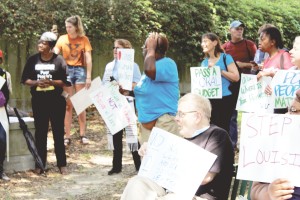Protestors focus on poverty at state capitol
29th May 2018 · 0 Comments
By Nayita Wilson
Contributing Writer
Organizers and protesters with the Louisiana Poor People’s Campaign said they will hold demonstrations outside of the state capitol over the next six weeks to bring attention to their political and economic concerns. The group announced its intent during a rally at the capitol two weeks ago to an audience of more than 40.
Louisiana’s Poor People’s Campaign: A National Call for Moral Revival is part of a national push to protest poverty, racism, war financing and ecological matters, according to campaign organizers. Similar rallies will take place at state capitols across the nation and is expected to culminate on June 23 when campaigners from various states gather at the U.S. capitol. 
Leaders of the Louisiana initiative include: Benjamin Zucker, co-director of Step Up Louisiana in Orleans; Dr. Lue Russell, a religious leader from Hammond; and Omari Ho-Sang, grassroots community leader from Shreveport.
Bishop E. René Soulé said the goal is to achieve a “better Louisiana” and told demonstrators that addressing their concerns with “corporate greed” would require citizens to vote leaders out of office.
Jeanie Donovan, policy director with The Louisiana Budget project, told demonstrators that the state’s proposed budget cuts to programs such as Medicaid and the Supplemental Nutritional Assistance Program (SNAP/food stamps) do not prioritize individuals with disabilities, the elderly, children and women.
She said senate amendments to the budget could eliminate SNAP, leaving more than 850,000 without enough food. “When I was a kid, my mom – my single mom – relied on food stamps, and so I know personally how important this program is to struggling working families. It is simply unacceptable for the senators to consider, let alone vote for, a budget that could leave mothers and children in our communities without enough food,” Donovan said.
The campaign is modeled after the 1968 Poor People’s Campaign envisioned by Dr. Martin Luther King Jr. and the Southern Leadership Conference (SCLC). It was carried out by Rev. Ralph Abernathy following King’s assassination.
As documented in The King Center’s digital archives, King, in a 1967 public statement on the Poor People’s campaign, expressed that the campaign would mobilize masses at the nation’s capital to secure social, economic and political reform for Blacks and the poor. King also identified jobs or income as campaign priorities.
Louisiana organizers said in a statement: “Despite real political wins in 1968 and beyond, the original Poor People’s Campaign was tragically cut short, both by the Rev. Dr. Martin Luther King Jr.’s assassination and by the subversion of the coalition that sustained it. Still, the original vision and many of its followers did not go away.”
According to the U.S. Census Bureau’s 2017 population estimates, 20.2 percent of Louisiana residents live in poverty, and 12.7 percent of all U.S. citizens are in poverty.
The federal government’s Health and Human Services Department (HHS) sets poverty guidelines annually to keep up with inflation and to determine eligibility for government programs. HHS 2018 poverty guidelines by family/household sizes in the 48 contiguous states and the District of Columbia are: $12,140 (one person); $16,460 (two persons); $20,780 (three persons); $25,100 (four persons); $29,420 (five persons); $33,740 (six persons); $38,060 (seven persons); $42, 380 (eight persons).
Families/households with more than 8 individuals add $4,230 for each additional person.
The Council for a Better Louisiana (CABL), unaffiliated with the campaign, is a non-partisan agency that focuses on quality of life for all Louisiana citizens. CABL Executive Director Barry Erwin said the organization’s focus on education is most closely aligned with the poverty in the state.
“From our organization’s point of view of trying to help create a better Louisiana, education is just the key factor,” said Erwin, adding that data indicate connections between poverty, education, health care and criminal justice.
This article originally published in the May 28, 2018 print edition of The Louisiana Weekly newspaper.



